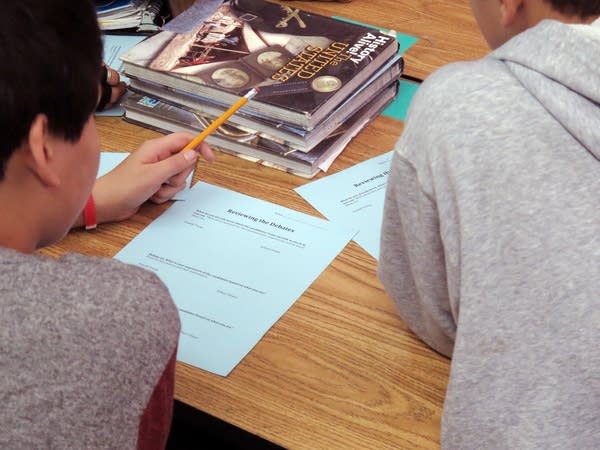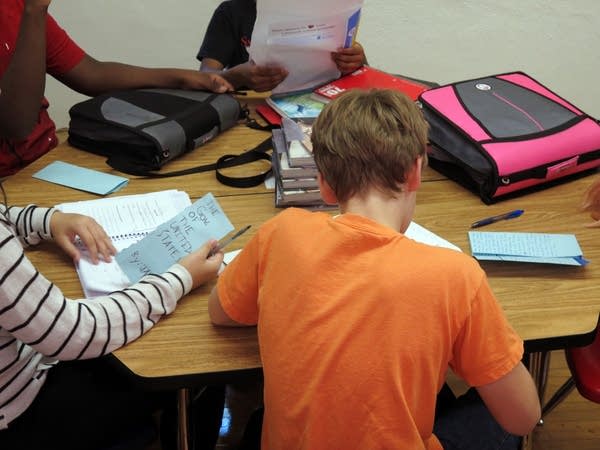Minnesota teachers get through the election with real talk, and sometimes gourds

Updated: 2:55 p.m. | Posted: 1:41 p.m.
Middle school teachers like Casey Metcalfe are struggling with how to handle the contentious 2016 presidential race.
That includes the debates, which have brought behavior from candidates that would get any seventh-grader sent to the principal's office — or worse.
Create a More Connected Minnesota
MPR News is your trusted resource for the news you need. With your support, MPR News brings accessible, courageous journalism and authentic conversation to everyone - free of paywalls and barriers. Your gift makes a difference.
"Who can, in a ... um ... in a school-appropriate way tell me what happened between the first and the second debate, that was a big deal?" Metcalfe asked his U.S. studies class the day before the final presidential debate.
The question prompted silence as students struggled to find "school-appropriate" words to describe the recently released Access Hollywood tape of comments by Republican presidential candidate Donald Trump.
"A tape came out where Donald Trump was talking about women in a very ..." 12-year-old Annabelle started, then trailed off. "Vulgar," another student supplied. "A very vulgar and inappropriate way," Annabelle finished.

Metcalfe nodded. With that hurdle cleared, the class moved on to discuss Trump's response to the tape and counter-accusations about Democratic presidential candidate Hillary Clinton's private email server.
Metcalfe said he works hard to keep class G-rated. But that isn't his only challenge.
He also walks a fine line between staying politically neutral and taking on important issues because like many teachers, he doesn't broadcast his own political beliefs in class.
"It's tough because you have to balance the fact that some students are feeling personally attacked by the candidate, feeling like who they are is an issue in a campaign, so you want to be able to defend them," Metcalfe said. "You want to be able to say, you know, 'I hear you and I see you and I want to be on your side.' But at the same time there are other students who are at a different place, and you want to be able give them a voice."
Bloomington social studies teacher Staci Buchanan said she's also careful to stay neutral. Buchanan said she won't answer the question students ask most often: "How are you voting?"
"My hope for my students is for them to have the ability and the skill set to determine their own political beliefs," Buchanan said.
But she noted it's difficult, especially given recent allegations of sexual assault against Trump. "How do we stay neutral when it comes to the issues, but then how do we address things that are devastating to hear as the general public, and don't condone as the general public?"

Buchanan said her solution is to keep her ninth graders focused on the issues. The students research a different topic each week and choose the candidate they align with. Then, before the election, students make a final choice.
For younger students, like those at Prairie Creek Community School in Castle Rock, getting candidates even farther out of the lesson may be a good idea.
"We created an alternative system called the United States of Gourd," said fourth- and fifth-grade teacher Michelle Martin.
The school made two parties, Poligourds and Free Gourds, with platforms that closely resemble the two major parties.
Martin said teachers bought out the garden store to give each student a squash. There's a debate leading up to the election.
"We needed to find a way to give the students a safe place to explore politics and the electoral process without it being a challenge to their parents' viewpoints," Martin said.
Back in Metcalfe's class at Sanford Middle School, 12-year-old Aniza said she's felt targeted this election season, especially by comments about Muslims from Donald Trump.
"It makes me feel mad because he thinks all Muslim people are terrorists and that's not true," Aniza said.
She added that it's important to talk about the rhetoric in class because "there's some kids who actually believe it, and they'll come up to you and say stuff ... they'll make jokes about terrorism."
The seventh graders were on the edge of their seats for the whole class.
Metcalfe said he believes students need to hear the reality of the campaign, and he encourages his students to watch the debates.
"I don't think that we can ever say that a political campaign is for mature audiences only," he said. "Because why are we teaching government in middle school if we can't talk about it in a real way?
"If we're not able to apply what we're learning about government and citizenship and the rights and responsibilities that we have — if we're not able to apply that to an election, then what's the point?"